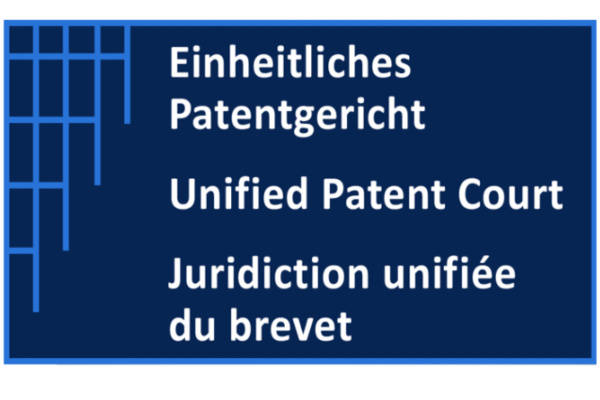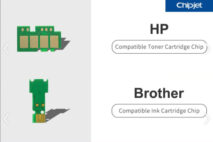Hewlett-Packard Development Company L.P., a wholly owned subsidiary of HP Inc., has filed suit against the third-party consumables vendor LAMA France at the recently opened Unified Patent Court (UPC) in the European Union (EU). HP alleges that the French firm, which markets an assortment of consumables under the UPrint brand in Europe, infringed two of the OEM’s European patents that cover technologies in its integrated print head (IPH) inkjet cartridges.
LAMA France is one of Europe’s more well-established third-party supplies vendors. The company’s UPrint-branded ink and toner cartridges are available at European retailers like Bureau Vallée and Electro Depot as well as on Amazon’s marketplace in France and Germany. According to the French Companies Register, LAMA France was founded in the autumn of 1989 and is based in Rillieux-la-Pape, a suburb of Lyon. LAMA France continues to be run by its founder Francois Lao, who owns a 50 percent stake in the company. It also operates two subsidiaries: the empties broker Récup’Cartouches and LM Eco Production, which collects, refurbishes, and markets IT equipment.
We will be following this case closely—at least to the extent possible. LAMA France may not be Europe’s largest third-party supplies vendor, but its role in the region’s non-OEM cartridge market is significant. Moreover, the fact that the case is the industry’s first at the UPC makes it newsworthy.
The Court
Before we dig into HP’s lawsuit against LAMA France, let’s first look at the UPC, which began hearing cases earlier this year. We appreciate that the formation of the court has not been without controversy, and the UPC itself certainly has its detractors. For the sake of brevity, however, we will not join in or opine on this ongoing debate. Rather we’ll just look at how it was formed and why.
European inventors have long sought a streamlined process to obtain patent protections that transcend national borders. It was this need that led to the formation of the European Patent Organization in the 1970s and the European Patent Office (EPO) in 1980. The EPO reshaped the patent system in Europe and gave inventors an effective avenue to expand their patent protections by having them validated in other European countries. Beyond Europe, the EPO also worked with foreign patent offices in the United States and Japan to exchange data and harmonize patent practices and processes.
After the EU was established, member states looked to further streamline the process for safeguarding patents internationally. At the end of 2012, the European Parliament agreed to certain regulations that laid the foundation for a unitary patent and unitary patent protections (UPP) in the EU. Filing for unitary patents eliminates the requirement of validating patents with various EU member states, which involves obtaining individual translations of a patent and paying publication and renewal fees as well as complying with a country’s individual formal requirements. Those applying for patents in Europe may still seek the protections and enforcement provided by an individual country by opting for validation of what’s become known as the “classical” European patent as well as filing for the expanded protection the unitary patent affords.
Shortly after the UPP framework was drafted, a group of EU member states agreed to set up the UPC. Working in accordance with EU laws and the Court of Justice along with the EPO, the UPC hears disputes related to unitary patent claims, and optionally it can rule on matters associated with classical European patents. Rather than filing suit in various national courts and incurring the costs of running parallel litigation, which may also yield diverging decisions, the UPC has jurisdiction to hear and rule on cases in those countries that recognize the court. According to the UPC website, 17 EU member states have currently ratified the Agreement of the UPC and any of the remaining member states “could still accede to it anytime.”
While the UPC Agreement was signed in February 2013, for many reasons, including the spread of COVID, it took over a decade for it to go into effect with the UPC opening in June 2023. There are currently 19 Courts of First Instance operating in the UPC system and the Court of Appeal is in Luxembourg. There are also UPC Patent Mediation and Arbitration Centers in Portugal and Slovenia, and the UPC runs its training center for judges and administrators in Hungary. The UPC began hearing cases in September.
HP v. LAMA
HP filed suit against LAMA France at the UPC Court of First Instance in Paris. According to details posted on the UPC website, the formal receipt of HP’s infringement action against LAMA France is listed as October 11, 2023. While the court did not provide access to the actual complaint, the post indicates HP is claiming that the defendant infringed two European patents:
- EP2089230, (‘230), “Fluid Ejection Device with Data Signal Latch Circuitry,” which was issued in 2012; and
- EP1737669, (‘669), “Fluid Ejection Device,” which was issued in 2014.
This is not the first time that HP has moved to enforce its intellectual property protections on the ‘230 and ‘669 patents. In 2018, attorneys for HP Deutschland GmbH sent cease-and-desist letters to an unknown number of inkjet cartridge remanufactured cartridges sellers in Germany warning the recipients that they faced lawsuits unless they ceased the sale of certain non-HP inkjet cartridges claimed to violate the OEM’s patents (see “Details Emerge on the Cease-and-Desist Letters HP Sent to Remanufactured Cartridge Sellers in Germany”). The infringement claim centered on the principle of regional patent exhaustion.
Under Europe’s regional exhaustion system, patent rights are exhausted when a product is sold within the EU and European Economic Area (EEA), but patentees retain patent rights in products sold outside the region. That once was true in the United States, but in 2017 the U.S. Supreme Court decided in Impression Products v. Lexmark International that patent holders would lose patent rights after first sale regardless of where a product was first sold (see “U.S. Supreme Court Sides with Impression Products and against Lexmark on Patent-Exhaustion Questions”). But in the EU, patent holders still retain patent rights in an empty cartridge first sold in Asia, for example, if it is refilled or remanufactured and subsequently sold in Europe.
The third-party cartridges noted in the letters that HP’s attorneys sent out in Germany were alleged to have violated patents on HP’s IPH cartridges. Specifically, the offending cartridges were remanufactured HP 302 and 302XL black and tricolor inkjet cartridges. The corresponding North American cartridges are the HP 63 and 63XL series, the equivalent cartridges in Latin America are the HP 123 series, and the cartridges for China, India, and Indonesia are the HP 803 series.
More recently, HP sent out similar cease-and-desist letters in 2021 in Argentina, Chile, Mexico, and South Korea alleging that vendors in these countries were selling infringing ink cartridges that violated regional patents that are counterparts to the ‘230 and ‘669 European patents (see “HP Takes Action to Protect Its Inkjet Patents in Latin America and Korea”). These more recent cease-and-desist letters differed from those sent by HP Deutschland GmbH in one key area. In Latin American and Korea, the vendors were selling new-build compatible IPH cartridges. In addition to the cease-and-desist letters, HP filed lawsuits in Brazil against Ascensus Trading & Logística Ltda.; Capital Trade Importação e Exportação Ltda.; Potencial Suprimentos de Informática Ltda.; and Drc Solar e Suprimentos de Informática – Eireli, which have since been settled.
More to Come
Because we could not gain access to the documents filed with the UPC, it is unclear if HP is accusing LAMA France of selling infringing remanufactured cartridge or infringing new-builds. Either way, we think it’s a big deal for both HP and the defendant. It also may be a harbinger that more suits are to come.
If the French firm is selling remanufactured cartridges made with cores that do not comport with Europe’s first-sale doctrine, it seems likely that its subsidiary Récup’Cartouches is similarly marketing infringing cores, which would be bad news for European refillers purchasing cores from LAMA France’s empties broker. On the other hand, if the French firm is peddling infringing IPH new-builds, it would all but guarantee that LAMA France is sourcing its clones from a third party. Manufacturing cartridges with integrated print heads from scratch is extremely difficult because of the advanced technologies involved. So, if LAMA France is selling new-build IPH SKUs, we could see HP hauling the clone manufacturer into a court room either in Europe or in some other region.
The fact that HP has filed suit at the UPC is also significant. Because of what appears to be surging popularity in unitary patents, the significance of the UPC in European patent law is bound to grow. According to sources following developments related to the UPC like the Kluwer Patent Blog, which is published by the intellectual-property law firm Kluwer Law International, the EPO had registered 7,262 unitary patents by the end of August. If even a small percentage of those patent holders look to enforce their protections, the UPC judges can expect a growing number of cases, which will shape the European market.
We expect more news will emerge about HP’s lawsuit against LAMA France and that we’ll be hearing more over time from the UPC. In either case, we’ll share the information just as soon as we can!






